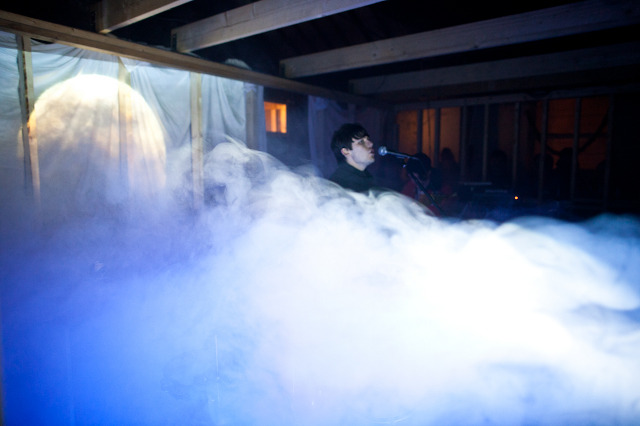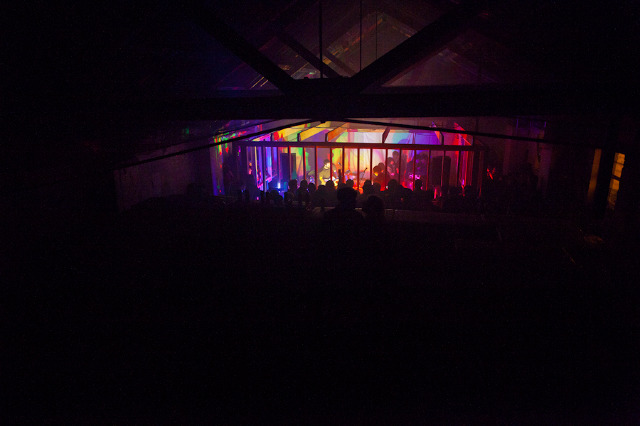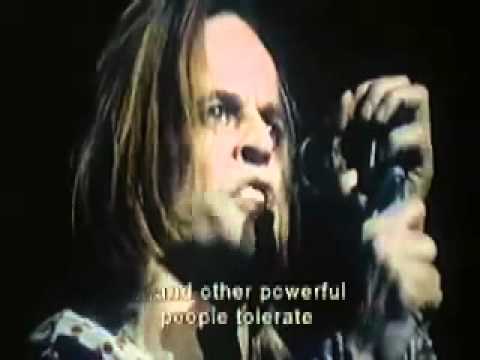If any cultural artefact had to be at the root of Manchester’s most promisingly awkward and uncompromising record label since Factory, then it makes sense for it to be Stanley Kubrick’s vivid, prescient and once-elusive masterwork, A Clockwork Orange. Add in the fact the source book was authored by a Mancunian – Anthony Burgess – and the loops of logic take shape.
Certain people – mainly men my own age (32), or slightly older – have a uniquely close relationship with this film, this original ‘video nasty’ and the pirate form that they first heard about, or watched it in. And when quiet, withdrawn Ben Ward saw the brashly extrovert Martin Hurley peddling his hooky copy of this illicit wonder to fellow students at Manchester College, Ben saw the possibility and promise of a connection.
As with The Exorcist and Texas Chainsaw Massacre and any other video nasty that had been pulled from the public eye (for various antiquarian/moral/artistic reasons), A Clockwork Orange was pure taboo; verging on porn.
Hearing schoolyard and/or college rumours of Alex DeLarge and his excitably violent Droogs, stalking the mundanely surreal landscape, on the lookout for victims, and potential scenes and sites of ultraviolence, was a memorable thrill in itself. Few had seen it. Fewer still actually owned a copy.
But many of us liked to talk and speculate about it – and even fake ownership of it. Visual possessions weren’t the same back then in the 90s. You didn’t ‘own’ much in the way of moving images. You mainly listened and imagined, and tried to capture the image/s for posterity, or kicks.
For Ben it was a pivotal moment. Growing up in Edgely, Stockport, he may as well have been transparent at school. Yet, back home, under the close scrutiny of his strictly Christian stepfather and mother, he felt watched, like a manageably mad animal is watched in a cage.
He knew the religious stuff was a load of shit; knew also that his step-father should have known better, should have given him a break occasionally, and certainly never once sat him down at the small table in the kitchen, asking what’s this? When clearly ‘this’ was the picture of a naked women ripped from the pages of a porno magazine, with a hole in place of her vagina, where Ben would stick his dick. There was no need for that level of parental authority. The shaming need not have been so intense.
What kept him going through this challenging period was the music of Pulp; Jarvis Cocker’s "subversive, suburban, and seedy lyrics", as Ben describes them. Stockport’s not called Swingersville for nothing, and he saw a connection there, with Cocker’s Sheffield; an ally, a confidant, of sorts; as he did again a few years later when he met Martin at College, brandishing that most taboo of banned videos.
The story of SWAYS records is written within all of these disparate elements: the teenage loneliness and longing, Alex and his Droogs, the love of indelible visual images, the solace one finds in a fellow outlaw. And so from that early meeting in college, after Martin had passed on his dodgy copy of A Clockwork Orange, and after he’d taken Ben down to see his Polish grandad’s bag factory in Salford; and after both went their separate ways, but Ben kept Martin’s bass guitar; three years passed, and Martin wanted his guitar back, and so naturally they formed a band called The Marder in the (now empty) bag factory. A dazzlingly inventive threesome that sounded like The Fall, Magazine and The Pixies condensed into trailer form.
But aside from producing a pocket rocket of a song that name-dropped the likes of Orson Welles, Bruno Ganz, Arnold Clark and ‘Fucking Michael ‘Batman’ Keaton’ – bearing the Communist-tinged title: ‘I’m Perestroika’.
In 2005 they played their first show in Manchester. In 2008 they recorded with Steve Albini. In 2009 they released their debut/last EP – Men’s Ruin on 10” vinyl.
They remain a cult hit amongst certain people in Manchester and further afield, but their awkward talents and equally awkward songs were overshadowed by two different forms of music that have continued to plague Manchester since the late 90’s: ‘Lad-Rock’, as perfected by the lite-Liam Gallagher-ites The Courteeners and countless others. And something else altogether: a casually misogynistic form of pub-based-folk music, mastered by the likes of Elbow and I Am Kloot; wherein the viewpoint is mainly that of a victimised male whose downfall is women. In its own unbending way, it’s every bit as conservative as Oasis supposedly were, but without the cocky, seize-the-moment front – or without the honesty, you could say.
This faux sensitive viewpoint has bled into many immensely successful corners of modern society. Manchester’s Oldham St (or the newly named and newly-gentrified Northern Quarter) is awash with men and women, boys and girls dressed nose to toe in thrift, in tweed and ratty jumpers etc. Some of the men wear fashionably Victorian moustaches. Some of the girls bake Fanny Craddock cup cakes. They wouldn’t harm a flea. They’re incapable of harm. Everybody’s sensitive, but everybody’s on the make as well. It’s all very symptomatic of our times, this new form of hip conservatism that wallows – quite literally – in stagnation and victimhood. The trick is to appear deeply emotive whilst raking in dough and maintaining power.
As a viewing public, we now should feel sorry for politicians because they shed a tear when Piers Morgan gives them a platform to reveal their inner hurt. All the while, his/her cabinet is getting away with murder. The emphasis has shifted ever so subtly. The unemployed kids in tracksuits from shockingly under-developed backgrounds are vile bodies, but the men in suits who make the decisions are deeply human and sensitive.
On a less drastic, but equally insidious note, take Elbow’s BBC soundtrack for the Olympic; a six-minute song entitled ‘First Steps’. Lead singer Guy Garvey’s cosily insular relationship with the BBC has served him well. When he was supposedly ‘struggling’ to make ends-meet with Elbow, he was working for BBC Radio 6. Yet, Elbow’s story is now synonymous with struggle and hardship and everybody likes a plucky loser who can belt out an anthem. As with most – or all – forms of conservatism, of sticking close to the man, the only thing that’s being developed is one’s own bank balance. All the while, what’s being lost, and overlooked is the times we live in. The brave artist would have shunned this offer from the Olympics, or questioned the sham-like set-up of it all a la Morrisey and Live Aid; for the whole thing seems neither to be serving nor reflecting the real struggle, and gifted dexterity of the athletes involved but maintaining a dubious, and let’s be honest corrupt elite.

This is where Ben and Martin re-enter. After the demise of The Marder, and years of battling stiff promoters with little enthusiasm for their skew-whiff worldview, they fashioned a record label in 2011: SWAYS records, based in a studio facing Strangeway’s Prison. Their ethos is anti-ambition. Their maxim is: ‘Independent Label and Cultural Regenerator’. They’re not out to make a mint and uphold bogus authority. They know the artistic limitations of getting caught up in that world.
And so Ben’s been getting up for work recently having fallen asleep listening to all sorts of noises – the guttural night-cries of frustrated prisoners and sometimes Martin toiling away in the studio. He then schlepps it to work, endures the chatter of office folk, returns to the studio, nukes a microwave meal and listens to more noise. It’s all noise. He’s not had time to read. Not one minute to himself. People stop by the studio and they’re there for the night, necking cans that stay cold in the crisp air. And then there’s The Bunker nights. One each month. The place is packed to the rafters. People stood outside smoking and talking and staring out at the truncheon-like totem pole that is Strangeway’s Prison, that cuts the skyline and cuts lives short.
On the other side of town people are sat in bars, twirling moustaches and talking cake mixture, but back inside in The Bunker, the old industrial space, it’s a lively cross between a rave and some skewed conceptual art installation. The vast majority crowd round to watch the bands play in a wooden cage. The structure of which resembles the artist Francis Bacon’s space-frames (as he called them), wherein bodies, deprived of shape, squirmed and twisted under the rule of unseen elements. The caged life. The crowd watches the bands like Ben’s stepfather watched him, all those years ago. The connections are essential to his – and the label’s – story. It’s all backwards and forwards, between his stifled, straightjacketed youth, and the stifled, straightjacketed here and now of modern life, where success has no solidity, no grounding in what’s actually happening.
Up for work having listened to all those noises. He’s the new Mod in this respect. And he knows they’ve got some exciting bands on their label: Ghost Outfit, The Louche. That’s what keeps him going. Then there’s Money (and what a timely and ironic name that is).
Recently asked to play David Lynch’s new Parisian nightclub, Silencio, and fronted by the sharply cerebral Jamie Lee, it’s Money who has been the ‘catalyst for a lot of things’, in Ben’s words. He had them on his wish list for some time and now they’re delivering the goods in spades with a growing output that’s part Jack Nitzche, part film-composer Gustavo Santaolla, part The Smiths, Arcade Fire, Talk Talk and The Cocteau Twins.
The whole shebang – from Ben’s teenage troubles to that auspicious meeting at college and The Marder and on – is all written deep in the wondrously emotive veins of ‘Who’s Going to Love You Now’: Money’s first and only (to date) truly outstanding moment. And then there’s the video that’s inseparable from the song because Money are a ‘visual band’.
The connections are woven into a thrilling succession of slickly edited images: into the gargoyle-like face of a ranting Klaus Kinski, into Badlands Sissy Spacek and Martin Sheen, David Foster Wallace, Ronnie and Reggie Kray, porn and space and Stanley Spencer, war and crowd trouble and Elvis’s wobbly legs…And so on.
As the images pile up, suddenly Manchester seems slightly, but also noticeably, invigorated – less staid, less conservative and hungover and afraid to express itself. And though all this may just be a smidgen of hope, of false hope at that – it’s hope all the same.
“We seek to re-establish the Poetic, the Human Spirit and the Imagination as supreme soul commodities in a landscape that is increasingly spiritually impoverished and pervaded by technological and material ontology.
We wish to re-establish the sacredness of language.”
Words taken from the SWAYS pamphlet No.4 written by Jamie Lee [pictured below]:





